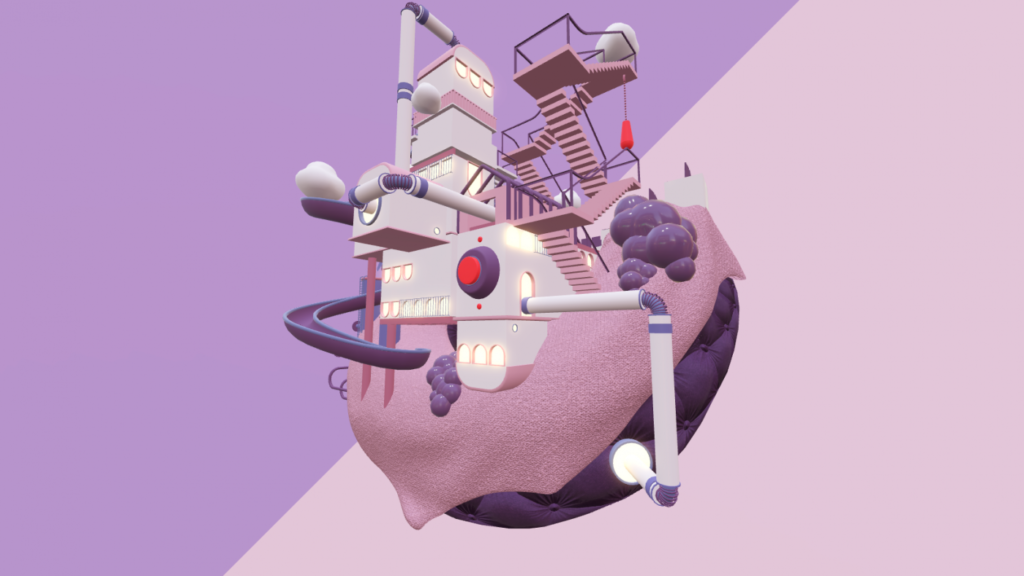
When the upcoming Grenoble Biennale moved online because of the COVID-19 pandemic, organizers wanted an experience that would replicate the creative energy that an in-person gathering of artists personifies.
Enter a team of faculty, staff, students, and alumni of Taubman College, who have been evolving digital scenographies for the past year.
Thanks to their efforts, attendees at the Grenoble Biennale, which begins on April 2, won’t spend their time in Zoom squares. Instead, they will enter a digital theater that is part of an interactive online platform that one of its creators, Jacob Comerci, calls “a factory for creative experimentation.”
Comerci, the program manager for Taubman College’s Academic Innovation team, is leading the platform design alongside alumni Oliver Popadich (web developer) and Ishan Pal (Taubman College’s new media specialist), as well as current student Ziyuan Li.
The site includes a performance space that allows viewers to experience a 360-degree immersive panorama designed for live public events. In addition, an atelier invites participating artists and designers to collaborate on developing projects. An archive will provide access to content developed by the collective, and a “Documenton” will use AI to generate thematically relevant, audience-tabbed media. Imagine a documentary edited on the spot through an interactive thematic feature. Instead of a website’s traditional buttons, this site integrates low- and high-tech features as simple as an over-scaled light switch and as fantastical as theremin-accompanied clouds. A ball rolling down a slide engages participants as the “Documenton” works to generate new digital media.
The Biennale also will feature a panel discussion as part of “Acts of Urbanism / Entre Actes D’urbanisme,” a collaboration between artists and architects in the French cities of Grenoble and Saint-Etienne and artists and architects in Detroit — including Associate Professor Anya Sirota, who also serves as associate dean of academic initiatives and is co-founder of the design firm Akoaki. She is curating “Acts of Urbanism.” During the Biennale, using a digital scenography created for the event, Sirota and her team will host a conversation between artists in Detroit and France that Comerci says is “half performance art, half casual conversation in a 360-degree panorama.”
While the pandemic triggered the need for an engaging, interactive online experience, the technology used for the Grenoble Biennale platform illuminates new ways to interact even when COVID-19 is behind us. It also builds on work that Taubman College began a year ago, when within weeks of moving online, a group of faculty, staff, and current and former students created a platform called CMOK that was designed to replicate the studio environment for final reviews.
The team’s subsequent work with digital scenographies has reimagined what is possible when it comes to online events — including design studios taught at Taubman, the 2020 summer competition series, and internal and external lectures including Feminist Architectural Collaborative (f-architecture). These vibrant, immersive experiences allow speakers to inhabit carefully calibrated digital scenographies that are engaging and interactive for the audience.
Additionally, during the past year Taubman College’s digital scenographies team has worked with Sirota on how to engage stakeholders in Detroit as plans develop for the Cultural Center Planning Initiative. In 2019, Sirota and her partners won an international design competition to unify disparate cultural sites into an 80-acre district. When the pandemic made it impossible to share models with the public, Sirota’s studio partnered with Oliver Popadich to launch ccpi.online, a navigable digital model. “It’s like a live pinup board that also hosts events,” explains Sirota, “so people can engage in collective conversation as they interact with the digital model.”
If users zoom in close enough, they can see the simulated thickness of paper in the lines of the modeled buildings, and trees rendered like they are made of extruded Plexi — precisely how the design team makes models in the physical presentation. “It’s a new way of engaging the public,” Sirota adds. “It shows how we can continue our practice and the activities that are integral to the design process even when the world has changed.”
With their various forms and audiences, Taubman College’s technical innovations over the past year “speak to our ethos of leveraging the tools of the internet to create different types of productive, collaborative environments that facilitate serendipitous interaction and bring us closer together,” says Comerci.
Now, with “Acts of Urbanism,” that technology will allow a conversation between international artists and Detroit residents to begin online that will hopefully lead to face-to-face engagement later this year.
“A lot of things were put on hold because of the pandemic,” says Comerci. “So to be able to work creatively to figure out a way to build community and engagement cross-culturally and transnationally feels great. I’m thrilled to be a part of it.”
Contact: Amy Spooner
Learn more about the 2021 Grenoble Biennale here.


